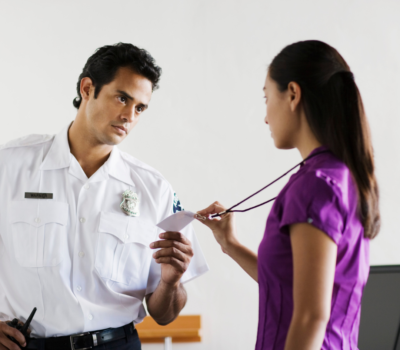When planning any event, whether a small gathering or a major public event, having the right type of security is important to ensure the safety of everyone involved: attendees, staff, and vendors.
Appropriate security measures can look different depending on the size and nature of the event, but some basic security examples may look like designated entrance and exit points, bag checks, metal detectors, name badge access, security personnel, etc.
Having clear and detailed emergency plans in place, as well as security staff who are trained and prepared to handle any potential emergencies, is essential for any event. By taking the necessary steps to ensure the safety of all involved, events can be enjoyable and worry-free for everyone.
1. Guest Security
Guest security is imperative for a successful conference.
Security staff will watch over the guests, make sure they follow the rules and stop anyone who is not allowed from entering the conference. (Hourly staff can assist with this as well!)
Many times, the information shared at conferences is private, so it is necessary to keep unregistered guests from seeing it, and security can help with that.
2. Audio Visual Security
To keep things safe, we check the ballrooms for people who aren’t supposed to be there, make sure doors are locked, and protect any audio-visual equipment left out overnight from being stolen or damaged.
It’s surprising how many microphones, laptops, and other small audio-visual equipment can disappear without this crucial security requirement.
3. Behavioral Security
The most effective way to monitor behavior at an event is to have a security team in place.
The security team should be well trained and experienced in crowd control and event management. They should also be familiar with the venue and the event protocol.
The security team should be equipped with the necessary tools and resources to ensure the safety of all attendees. They should also be able to identify any suspicious behavior and take appropriate action.
Additionally, they should be able to provide advice and assistance to those who may need it. This type of security is best utilized for inappropriate conference guest behavior such as intoxication.
4. Talent or VIP Security
Security personnel can be hired to keep famous people (like name-act talent) or VIPs of a conference safe and on time at conferences.
Depending on the person’s level of fame, partnering with the hotel to provide private access to a specific ballroom through back hallways can be a great solution for avoiding issues with fans or a delay in getting to the conference stage.
Security is important at events because it helps to protect the safety of all attendees, staff members, and event property. Plus, good security measures also help to maintain the event’s reputation and protect its financial interests. Don’t forget to add this to your budget line!

